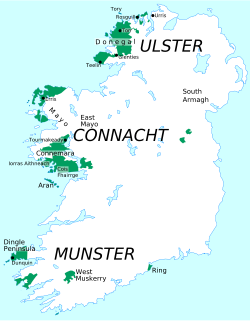Pan Celtic Unity - Welsh Language Commissioner Meets with Irish Parliament to Strengthen the Celtic Tongue
The Sub-Committee on the 20 Year Strategy for the Irish Language and Related Matters of the Irish Parliament (Oireachtas) met with Meri Huws, Welsh Language Commissioner, on Tuesday, 25th November 2014. The purpose of the meeting was for the Committee to consult with Commissioner Huws so as to benefit from the experience of Wales in the implementation of the Welsh language (Wales) Measure 2011.
The visit comes at a time when the Irish Language is in crisis. Dublin has come under withering criticism for its failure to support the implementation of the 20-Year Strategy. The perceived hostility of the Irish Government toward Gaelic and Dublin’s failure to support the Irish language triggered street demonstrations earlier this year and prompted the February 2014 resignation of then Irish Language Commissioner, Sean O' Cuirreain. In dramatic testimony before the same committee that met this week his Welsh counterpart, former Language Commissioner O' Cuirreain roundly condemned the Irish government for actively undermining efforts to save the Irish language. O' Cuirreain’s January 23, 2014 testimony was described by the Irish Times as "..a comprehensive and wide-ranging condemnation of the State and Government's record on the Irish language portraying the Irish Language as being continuously driven out to the margins of Irish society in a process accelerated by the inaction of Government, the civil service and the public sector."
In a press release, the sub-committee Chairman Michael McCarthy made the following statement on the Welsh language commissioner’s visit: "The 20-Year Strategy for the Irish Language 2010 - 2030 was published on 21st December 2010, following cross-party support in the Houses of the Oireachtas. Three years into the Strategy the current Joint Committee on Environment, Culture and the Gaeltacht, through its Sub-Committee on the 20-Year Strategy on the Irish Language and Related Matters, is now reviewing the progress that has been made to date in implementing the Strategy and to find out if the Strategy is achieving results. As we review the strategy, it is important that we look at examples of language renewal in other countries. The experience of Wales in developing the use of the Welsh language provides a good model for our sub-committee to consider. The office of Welsh Language Commissioner was created by the Welsh Language (Wales) Measure 2011. Meri Huws started as the first Commissioner on 1 April 2012. Before being appointed as Commissioner, Ms Huws chaired the Welsh Language Board from 2004-2011, and was also a member of the board from 1993 until 1997. Therefore, we are looking forward to meeting with Meri Huws tomorrow to discuss efforts to support minority languages."
Since her appointment on 2 April 2012, Welsh language Commissioner Huws has shown to be a tireless champion for the Celtic tongue of Wales. On assuming her post, Huws stated: "I will be a voice for the Welsh Language, acting on behalf of Welsh speakers. That is my promise. As I prepare to undertake this work, my vision is of a Wales where the Welsh language is central to public life, where Welsh speakers have the confidence to use Welsh and trust the law to right any injustice they may suffer for using the Welsh language."
Conversely, the emerging theme in recent reporting on the Irish Language Crisis is the undeniable hostility of the political parties that form the current ruling coalition, Fine Gael and Labour, to the survival of Gaelic. The unfortunate political element in the struggle to preserve the ancient tongue of Ireland is complicating efforts to implement the Language strategy whose primary goal is to increase the number of Irish speakers from a 2006 baseline of 83,000 to a target of 250,000 in twenty years. The visit by Welsh Language Commissioner Huws must be taken as a hopeful sign that the consultation between two Celtic nations struggling to preserve their ancient languages will strengthen the efforts to preserve, protect and promote the Irish Tongue.
http://www.oireachtas.ie/parliament/mediazone/pressreleases/name-25378-e...
http://www.transceltic.com/irish/fight-save-irish-language-exclusive-int...

- Emmett McIntyre's blog
- Log in to post comments






